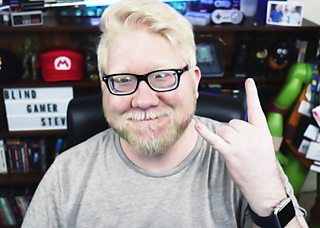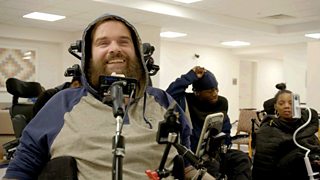The disabled gamers revolutionising video games
Gaming is more popular than ever, but disabled gamers have had to work hard to get a piece of the action.
The gaming industry is massive. It was recently reported that the worldwide revenue from videogames in 2020 would reach $179.7 billion, making it “bigger than the global movie and North American sports industries combined”, according to financial magazine MarketWatch.
However, disabled people have been locked out of playing most games because control options are not appropriate or because functions can’t be used by someone with limited motor skills, eyesight or hearing.
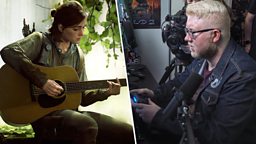
A childhood dream shattered – Steve’s story
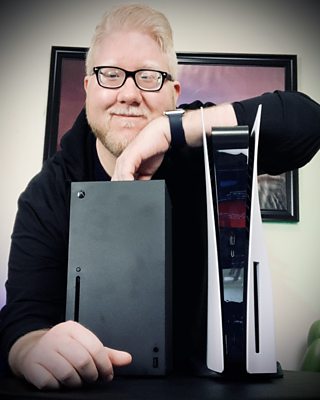
I realised I’m probably not going to be able to play video games ever again… and that hurt.Steve Saylor
The frustration this can cause is poignantly shown by the story of Steve Saylor. Steve suffers from an involuntary movement of the eye, known as nystagmus, meaning that images appear very far away (even with glasses) and blurry. A child of the 1980s and a huge fan of the Nintendo Entertainment System (“I remember holding it in my hand and thinking ‘this is the coolest thing ever’”), his first experience of gaming was bittersweet.
“Sweet”, says Steve, “because, watching my mum and brother play, I would celebrate when we did really well. I remember watching mum beat Super Mario before my brother and I did and we got all excited because, even though I wasn’t playing, I felt like I was celebrating the victory with my mum.”
“The bitter side was that any time they played or did well, I was like ‘man, I wish I could have done that’. There were times when I was like ‘well, I want to play too’ so, I would have my nose almost touching the screen in order for me to read the text that was there. I would constantly be getting a ‘game over’ screen. The amount of times I have seen a ‘game over’ screen in my lifetime… it’s a lot and that stuck with me. It was like ‘well, Stevie can’t do this’ and they would take the controller back from me and keep playing. Over time I became a reluctant gamer at best.”
The reluctance eventually turned to resignation and, in his late 20s, Steve traded in his consoles.
“It was then I realised I’m probably not going to be able to play video games ever again… and that hurt, it felt like giving up on something that I’d been doing all my life, I just thought I sucked at games.”
Getting a handle on access
Around the time that Steve was handing over his consoles, a grassroots movement was growing and starting to address the imbalance and unfairness of the situation.
One of the organisations at the forefront of this was , a charity for which Steve Spohn is the Chief Operating Officer. Steve suffers from Spinal Muscular Atrophy and needs a ventilator to survive. “That’s the great thing about tech,” Steve says, “some keeps us alive physically, like a ventilator, and some keeps us alive mentally, like video games do for many people.”
Steve recalls a game-changing moment at a conference he attended with AbleGamers founder Mark Barlet, hack expert Ben Heck and Adam Coe, CEO and founder of tech redesign company Evil Controllers. In short, after 40 minutes with a bag of rice and some wires, Heck and Coe had a prototype of a game controller that became the revolutionary AbleGamers Adroit Switchblade. The Switchblade was a predecessor to the Xbox Adaptive controller, which was a major step in mainstream recognition of the disabled gaming community.
Taking control – Mike’s story

Mike Begum from Austin, Texas, didn’t wait for a bespoke controller to get in the game, but he did start playing video games when he was just a toddler!

I use my cheek to use the control stick or the analog stick... I’m pressing the buttons with my tongue.Mike Begum
Born with arthrogryposis, a condition that restricts joint movement and muscle growth, as well as scoliosis, a sideways curvature of the spine, Mike doesn’t have much use of his arms or legs.
When his dad bought home a Nintendo Entertainment System, Mike was just two years old.
“It was more a thing that my dad wanted to get to entertain me,” says Mike. “One day he left the remote on the floor and I decided to try it. I put my wrist on the control panel and I could do left and right pretty well. My mum came in, saw it was me playing and was so shocked I was able to do these kinds of things.
“I just love playing, I just love doing something that I can do, as long as I can do it without the help of anybody or anything like that. I was able to do it and have fun with it.”
Mike is now a pro Street Fighter player, ranked among the top 300 in the world.
“To break it down for you, I use my cheek to use the control stick or the analog stick. Then I use my mouth area, so through the inside of my mouth I’m pressing the buttons with my tongue so I can use all the buttons I can.”
“I’m not here because I am a story, I’m not here for inspirational stuff. When I am gaming, when I go to a tournament. I just think about it’s me against my opponent. I want to win, that’s it. If I win, awesome, and if I lose, damn, but it’s just the way it is.”
Awareness goes up another level

The progress made by disabled gamers has been dramatic, and the high awareness of access in the industry has been demonstrated by the appearance of full-time jobs in the field. Adding momentum towards change was 2010’s Communications and Video Accessibility Act (CVAA) in the US, requiring the industry to look at access – the first legislation of its kind.
Meanwhile, if the release of the Xbox Adaptive Controller in 2018 was a high watermark for accessibility in terms of kit, 2020’s The Last of Us Part II was a major breakthrough for games themselves, with options covering players with fine-motor impediments, hearing loss, low-vision and blindness.
Game on, not game over, for Steve Saylor
After a long period steering clear of gaming, Steve Saylor made a niche talking about his experiences on a YouTube channel he rebranded as . The venture got him back into buying games again. “I had this epiphany. I’d been telling myself that I sucked at video games, but in reality games sucked for me.”
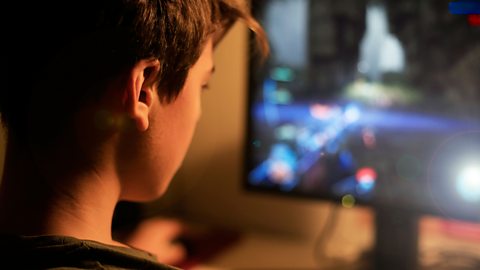
Why video games have a positive effect on you
How playing video games has a positive effect on your wellbeing, mood and creativity.
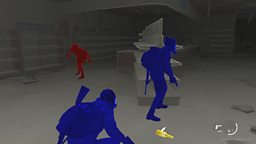
The moment those words were really borne out was when Steve was given an advance copy of The Last of Us Part II to review.
I’d been telling myself that I sucked at video games, but in reality games sucked for me.Steve Saylor
“I was able to do something I was never able to do before, I was actually able to lean back and feel more comfortable playing the game because of the amount of options there for me. I became emotional, I started sobbing for a good solid 10 minutes.
I started to think about my entire life trying to play games, and how I would have been able to be less frustrated when playing games with my friends and my brother. All of that was going through my head while I was looking at that menu screen.
“In 2020, I was able to play and complete in more games than I probably have been able to my entire life because of the care that has been put into accessibility that I never would have thought possible.”
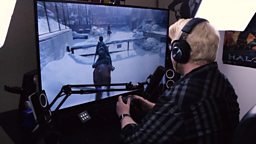
More from Radio 4
-
![]()
Unplayable: Disability and the Gaming Revolution
The disabled gamers making gaming more accessible.
-
![]()
Quad Gods: The world-class gamers who play with their mouths
The amazing true story of Chris Scott and his team.
-
![]()
Playing video games with the dead
The amazing ways that gamers have dealt with losing a loved one.
-
![]()
What If Everyone Was Disabled?
Mat Fraser imagines how different our world would be if everybody had a disability.
